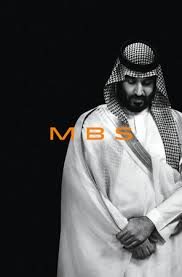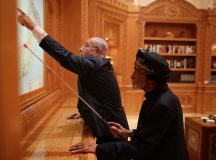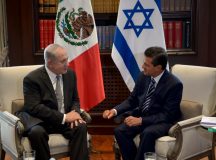Ben Hubbard’s new book is a biography of Saudi Arabia’s powerful Crown Prince Mohammed bin Salman, popularly referred to by the acronym MbS. It’s a very good account of how MbS quickly became a major figure in Saudi’s ruling monarchy, making dramatic changes to Saudi society. It’s a balanced account, chronicling the young crown prince’s achievements as well as his misdeeds.
Hubbard is an experienced journalist for The New York Times. He has covered the Middle East for several years and is fluent in Arabic. The book’s descriptions of Saudi culture and society often include examples from his first-hand experiences. He also talks about some of his bizarre experiences obtaining Saudi visas, culminating in a prized five-year multi-re-entry visa that he was finally given being suddenly revoked under the incredibly lame pretext that it had only been granted to cover a single event!
While not much is known about MbS’ youth, Hubbard manages to paint a picture of what his early life and childhood were like. His father, Salman bin Abdulaziz Al Saud, was mayor of the Saudi capital Riyadh for 48 years, overseeing its transformation into a major metropolis, before becoming King in 2015. MbS stuck close to his father, shadowing him and absorbing the workings of the state and the who’s who of powerful clerics and tribesmen at a young age, which undoubtedly gave him contacts and experience that aided his dramatic rise to power.
MbS was not initially the crown prince when his father became king, but deputy crown prince second to Mohammed bin Nayef (MbN), King Salman’s nephew, who was known and respected for organising the kingdom’s effective crackdown on Al Qaeda. He was also favoured by the Americans and cooperative with the CIA. How MbS threatened and coerced MbN to give up that position in his favour was an early sign of his cunning and ruthless style. It was also done in a similar way to MbS’ imprisonment of numerous prominent and wealthy Saudis in the Ritz Carlton Hotel in Riyadh – then dubbed by the media as ‘the most luxurious prison in the world’ – and the bizarre and infamous kidnapping of Lebanese Prime Minister Saad Hariri to force him to resign. The book gives good accounts of both incidents. Hubbard’s choice to narrate developments in chronological order was a smart one. It makes the book a good read and enables him to show how MbS amassed so much power and make dramatic changes in the kingdom.
Jamal Khashoggi, the journalist who was murdered and infamously dismembered in the Saudi consulate in Istanbul, is also a recurring character throughout the book, which makes sense given how his fate and MbS’ political fortunes were in some ways intertwined. Hubbard shows, through the reprinting of exchanges between the two, how his American friend Maggie Mitchell Salem often encouraged Khashoggi to take a more critical tone against MbS and his actions during Khashoggi’s years of self-imposed exile in the US, when he wrote regular columns about Saudi Arabia for The Washington Post. Khashoggi didn’t consider himself a dissident but felt obligated to challenge many of MbS’ decisions. Hubbard also reprints several excerpts of messages between Khashoggi and Mitchell Salem in which Khashoggi confirms leaving the Saudi embassy safely each time he visited it in Washington that are, for obvious reasons, quite eerie to read in retrospect.
MbS has overseen some incredible transformations of Saudi society in a very short time span and Hubbard gives him credit where credit is due. In his mid-30s, MbS undoubtedly understands the youth of Saudi Arabia far better than the ossifying kings that had ruled for decades. Women are legally allowed to drive for the first time, the ban on cinemas and other such public entertainment such as operas has been abolished. MbS side-lined the hard-line clerics and got rid of the notorious morality police, who infamously forced schoolgirls to die in a nightime fire back in 2002 because escape would have been a violation of the kingdom’s mandatory Islamic dress code.
The book illustrates how these reforms were strictly top-down. For example, when the ban on women driving was lifted the state cracked down hard on those women activists who had previously protested the ban, imprisoning and even torturing some of them. This was a clear bid to ensure that they could not claim that their activism had succeeded in bringing about the end of the ban, and a signal to other would-be activists not to challenge the authorities or think that activism could compel the authorities to make further reforms.
MbS has developed Vision 2030 plan, which aims to open up Saudi society, bring tourism, and diversify its economy by reducing its heavy reliance on oil. He has sought to emphasise that the kingdom is turning a new page, eagerly promoting projects such as NEOM, an ultra-modern city planned for the kingdom’s Red Sea coast that will cost approximately $500bn and include everything from mechanical dinosaurs and robotic gladiators to glow-in-the-dark sand.
Taking a mostly revisionist reading of history, MbS has depicted Saudi Arabia as a much more open society before 1979, denied Wahhabism has been a significant factor in Saudi society, pinning all the blame for the extremism and instability that have plagued the Middle East for decades on Iran, his arch-enemy.
On the foreign policy front, the crown prince has made some impulsive decisions. He launched the air campaign against the Houthis in Yemen, claiming would last mere weeks back in 2015. Hubbard saw first-hand how it caused misery for many innocent Yemeni civilians caught in the crossfire and argues that it drove the Houthis closer to Iran. MbS’ economic blockade of Qatar failed to extract concessions from Doha and also drove that country closer to Iran and Turkey, who then helped it effectively circumvent the embargo.
Near the end of the book, Hubbard speculates that MbS’ firm rule means few Saudis now risk challenging the wisdom of his decisions. He quips that the crown prince probably ‘meets few people with the courage to blunt his more destructive impulses or an incentive to tell him that a beach with glow-in-the-dark sand is less crucial to Saudi Arabia’s future than investments in peace, education, and the rule of law’.
That being said, there are also some signs that MbS has matured. For example, he has gone from someone whose thoughts came so fast that he would interrupt himself mid-sentence to someone who now talks a little less and listens a little more. This may suggest that he will make fewer rash decisions, especially after the international outcry over the sordid Khashoggi affair, the failure of the Yemen campaign to achieve a decisive military victory as well as the failure of the blockade on Qatar to bring Doha to heel.
There are signs that King Salman, who is in his 80s, is showing signs of senility. MbS is undoubtedly the real power behind the throne and most likely Saudi Arabia’s next king and the youngest yet, by far. This, along with his consolidation of control over key Saudi state institutions, means he could well rule until the 2060s. Consequently, Hubbard’s new book is essential reading for understanding a man who has already made a huge impact on Saudi Arabia and will likely be an important figure for decades to come.




































